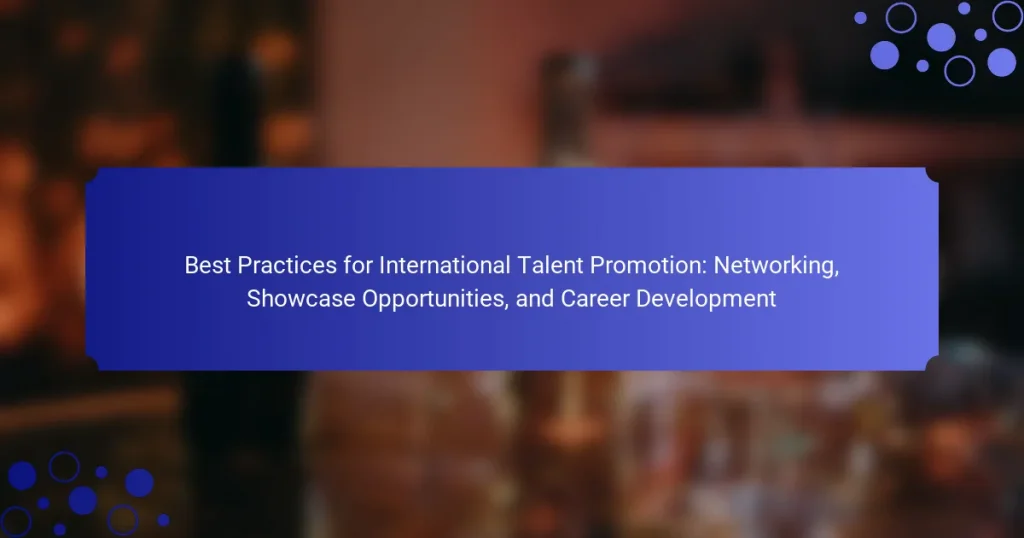International talent promotion focuses on enhancing visibility and career opportunities for skilled individuals across borders. Key practices include leveraging networking to connect talent with industry leaders, providing showcase opportunities such as competitions and exhibitions to highlight skills, and supporting career development through mentorship and training programs. These strategies not only improve talent capabilities but also contribute to higher retention rates and employee satisfaction within organizations. Notably, a LinkedIn study indicates that 85% of jobs are filled through networking, emphasizing the critical role of relationship-building in effective talent promotion.

What are the best practices for international talent promotion?
The best practices for international talent promotion include leveraging networking, providing showcase opportunities, and supporting career development. Networking facilitates connections between talent and industry leaders. It enhances visibility and fosters collaborations. Showcase opportunities, such as talent competitions or exhibitions, highlight skills and achievements. These events can attract attention from potential employers. Supporting career development through mentorship programs and training enhances talent capabilities. Organizations that invest in these areas report higher retention rates and employee satisfaction. According to a study by LinkedIn, 85% of jobs are filled through networking. This statistic underscores the importance of building relationships in talent promotion.
How does networking contribute to international talent promotion?
Networking facilitates international talent promotion by creating connections among professionals across borders. These connections enhance visibility for talented individuals. Networking events allow talent to showcase their skills and achievements. Personal recommendations often arise from these interactions. Such endorsements can lead to job opportunities or collaborations. According to a LinkedIn report, 85% of jobs are filled through networking. This statistic underscores the critical role of networking in career advancement. Networking also fosters cultural exchange, enriching the professional landscape. This exchange can attract diverse talent to various industries globally.
What strategies can enhance networking for talent promotion?
Effective strategies to enhance networking for talent promotion include leveraging social media platforms, attending industry conferences, and participating in professional organizations. Social media platforms, such as LinkedIn, allow professionals to connect, share achievements, and engage with industry content. Attending industry conferences provides opportunities for face-to-face interactions, fostering relationships and collaborations. Participating in professional organizations offers access to resources, mentorship, and networking events that can enhance visibility. Research from the Harvard Business Review indicates that 70% of jobs are found through networking, underscoring its importance in talent promotion. Establishing a personal brand and consistently engaging with peers can further strengthen these networking efforts.
How can social media be leveraged for effective networking?
Social media can be leveraged for effective networking by facilitating connections and interactions among professionals. Platforms like LinkedIn, Twitter, and Facebook enable users to showcase their skills and expertise. Users can join industry-specific groups to engage in discussions and share insights. Additionally, social media allows for the sharing of relevant content, enhancing visibility within professional circles. Networking events and webinars can be promoted through these platforms, attracting like-minded individuals. According to a LinkedIn survey, 85% of jobs are filled through networking. This statistic highlights the importance of utilizing social media to expand professional networks.
What showcase opportunities are available for international talent?
International talent can access various showcase opportunities. These include international film festivals, art exhibitions, and music competitions. Events like the Cannes Film Festival and Venice Biennale attract global attention. Additionally, platforms such as SXSW and Edinburgh Festival Fringe highlight diverse talents. Many organizations also host talent showcases, like the Global Talent Summit. These events provide networking possibilities and exposure to industry professionals. Participation in such showcases can lead to collaborations and career advancements.
Which events are most beneficial for showcasing talent?
Talent showcases at industry conferences are most beneficial for showcasing talent. These events attract key stakeholders and decision-makers. Examples include the Cannes Film Festival for filmmakers and the South by Southwest (SXSW) for musicians and tech innovators. They provide networking opportunities with influential professionals. Additionally, competitions like talent contests or hackathons highlight individual skills in a competitive environment. These events often lead to job offers or collaborations. Research shows that 70% of professionals find job opportunities through networking events.
How can talent prepare for showcase opportunities?
Talent can prepare for showcase opportunities by honing their skills and creating a strong portfolio. They should practice their performances or presentations regularly. This helps build confidence and polish their craft. Networking with industry professionals is also crucial. Attending workshops and events can provide valuable connections. Additionally, researching the showcase format and audience enhances preparation. Tailoring content to meet the expectations of the audience increases engagement. Lastly, seeking feedback from mentors can provide insights for improvement. These strategies collectively enhance a talent’s readiness for showcase opportunities.
What role does career development play in international talent promotion?
Career development is crucial for international talent promotion. It enhances skills and competencies that are essential in a global market. Organizations that invest in career development attract diverse talent. This investment fosters loyalty and reduces turnover rates. Career development programs also provide networking opportunities. These connections can lead to international collaborations and partnerships. Furthermore, employees with clear career paths are more motivated. Motivation increases productivity and innovation within teams. According to a LinkedIn survey, 94% of employees would stay longer at a company that invests in their career development. This statistic underscores the importance of career development in promoting international talent effectively.
How can mentorship programs support career development?
Mentorship programs support career development by providing guidance and knowledge from experienced individuals. They facilitate skill development through tailored advice and feedback. Mentors help mentees navigate career paths and set professional goals. Networking opportunities arise from mentor connections, expanding professional circles. Research shows that mentorship can lead to higher job satisfaction and career advancement. A study by the American Psychological Association found that mentees are promoted five times more often than those without mentors. This demonstrates the significant impact mentorship has on professional growth and success.
What skills are essential for career advancement in an international context?
Essential skills for career advancement in an international context include cultural intelligence, language proficiency, and adaptability. Cultural intelligence enables individuals to navigate diverse work environments effectively. Language proficiency enhances communication and collaboration across borders. Adaptability allows professionals to respond to changing global dynamics. Research shows that companies prioritize employees with these skills for leadership roles. A study by the World Economic Forum highlights the importance of soft skills in a globalized economy. These skills contribute significantly to professional success and organizational growth in international settings.
How can individuals measure the effectiveness of their talent promotion strategies?
Individuals can measure the effectiveness of their talent promotion strategies by analyzing key performance indicators (KPIs). KPIs such as employee retention rates indicate how well talent is being nurtured. Tracking promotion rates within the organization shows the success of development programs. Feedback from talent through surveys can provide insights into the perceived value of promotion strategies. Measuring engagement levels can help assess how motivated employees feel about their career growth. Additionally, monitoring the number of internal applications for higher positions reflects the attractiveness of promotion opportunities. Data from these metrics can guide adjustments to strategies for improved outcomes.
What are the common challenges faced in international talent promotion and how can they be overcome?
Common challenges in international talent promotion include cultural differences, language barriers, and varying expectations. Cultural differences can lead to misunderstandings in communication and collaboration. Language barriers may hinder effective interaction and relationship-building. Varying expectations regarding job roles and career development can create conflicts.
To overcome these challenges, organizations should invest in cross-cultural training programs. These programs can enhance understanding and cooperation among diverse teams. Providing language support services can also facilitate better communication. Establishing clear guidelines and expectations for roles can align team objectives.
Research indicates that companies with strong cultural competence see improved employee satisfaction and retention rates. A study by the Harvard Business Review found that inclusive workplaces enhance innovation and performance. This evidence supports the effectiveness of addressing these challenges proactively.
What resources are available to assist in overcoming these challenges?
Resources available to assist in overcoming challenges in international talent promotion include networking platforms, mentorship programs, and career development workshops. Networking platforms like LinkedIn facilitate connections between professionals and organizations globally. Mentorship programs provide guidance from experienced individuals in the industry. Career development workshops offer training and skills enhancement relevant to specific fields. These resources help individuals navigate challenges in showcasing their talents and advancing their careers internationally.
What practical tips can enhance international talent promotion efforts?
Enhancing international talent promotion efforts can be achieved through targeted networking, effective showcasing, and robust career development initiatives. Building relationships with industry leaders facilitates access to diverse talent pools. Organizing international job fairs can showcase opportunities to potential candidates. Providing mentorship programs can guide talent through the recruitment process. Utilizing social media platforms increases visibility for job openings. Collaborating with educational institutions can connect organizations with emerging talent. Offering relocation assistance makes positions more attractive to international candidates. Regularly assessing and adapting strategies ensures alignment with global talent trends.
The main entity of the article is ‘international talent promotion.’ This article outlines best practices for effectively promoting international talent through networking, showcase opportunities, and career development. Key strategies include leveraging networking to build connections, utilizing showcase events to highlight talent, and investing in career development initiatives such as mentorship programs. The article also addresses common challenges faced in this promotion, such as cultural differences and language barriers, and offers practical tips to enhance efforts in attracting and retaining diverse talent.


